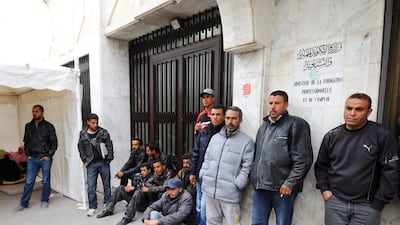The World Bank’s Doing Business report is a bit like a Nobel Prize. It comes around at roughly the same time every year and confers glory on its winners. Both have been especially kind to Tunisia this year. Business friendliness has improved in the birthplace of the Arab Spring according to the latest World Bank report, which was published at the end of October. And the 2015 Nobel Peace Prize, of course, went to four Tunisian civil society groups to felicitate their country’s determined embrace of peaceful democratic change.
But all commendation is relative and not all of it makes sense. If the World Bank is to be believed, for instance, it is supposedly easier to do business in Vladimir Putin’s partially-reformed Russia, which is ranked 51st, than in Luxembourg, which is 61st, even though the latter has historically had great respect for contracts and low inflation.
For Tunisia, which is 75th of 189 economies on the Doing Business list, three positive changes are recorded. Reduction of the rate of corporate income tax; improved efficiency in the state-owned port handling company; and investment in infrastructure at Rades, the largest commercial port near the capital Tunis. These have not really reflected in economic growth or on the streets of Tunis as yet and it is doubtful they are enough to greatly change Tunisia’s prospects.
Unemployment is higher than when mass protests against Zine El Abidine Ben Ali’s regime began in late 2010. Two terrorist attacks have undercut tourism, its third-largest industry, and the government seems to be doing little to find a replacement revenue stream. Globally, Tunisia is 103rd when it comes to ease of starting a business and it seems to care little. Last year, it actually became harder to set up a company because registration costs rose. It takes nearly two years to enforce a contract through the Tunisian courts compared to a little over a year in France. Unsurprisingly, the finance ministry admits that growth was just 1 per cent in the first half of the year, which is pitiful compared to the solid 4.5 per cent it averaged every year between 2000 and 2010.
Clearly, all the goodwill in the world towards Tunisia cannot compensate for its failure to execute economic reform. Olive farming offers some measure of its entrenched problems. Though a combination of circumstances – poor harvests in Spain and Italy and a bumper crop in Tunisia – has enabled Tunisia to become the world’s second largest producer of olive oil this year, it hasn’t been able to properly leverage production even at a time of soaring prices. There is little sign that Tunisia will be able to capitalise on its sudden prominence in the global olive oil league of producers and that it will push towards value-added bottled and branded products that sell at a huge mark-up unlike the bulk exports routinely dispatched to Italy and Spain. Even though 80 million olive trees cover a third of the country’s arable land, Tunisia has done little to liberate farmers from their dependence on a good rainfall for a good crop by improving irrigation systems. This is a failure of infrastructure, of course, but also of vision and strategic planning.
This is the context within which to read Tuesday’s high-profile sales pitch for Tunisia in Washington by Houcine Abassi, general secretary of the Tunisian General Labour Union. It came just as finance minister, Yassine Brahim, outlined ambitious plans to double foreign direct investment to $2.5 billion by 2020 by means of a new investment law and a new body designed to smooth companies' path as they set up shop in Tunisia.
Though the minister and the trade unionist might have seemed a class double act, they bookend the rather sad unfinished story of Tunisia’s revolution. The focus has been too heavily on security and politics rather than the uprising's economic factors. This is why Mr Abassi’s 400,000-member union, which shared this year’s Nobel Peace Prize, suffers little from the consequences of forcing the cash-strapped government into a 15 per cent pay rise for 800,000 public sector workers.
The deal, signed in September, adds about $280m to the public spending bill and makes it harder to pursue the institutional reform Tunisia badly needs and yet the finance minister meekly described it this week as the cost of buying “a climate of social peace”.
This is an ominous phrase and possibly a sign of what Amel Boubekeur, an expert on Maghbreb politics and revolutions in the Arab world, describes in a new paper as “bargained competition [which avoids] potentially explosive issues, such as structural economic reform” in the new Tunisia.
The problem, of course, is that the new compact is as much a betrayal of the Tunisian revolution as if the country had descended into chaos or reverted to authoritarian rule. The uprising was for bread and freedom, economic reasons just as much as political grievances and yet, each of Tunisia’s five transitional governments since 2011 has dealt with just the politics.
This is dangerous for Tunisia’s transition because it undermines the people’s faith in the benefits of democracy. Last month, Mohsin Khan and Karim Mezran of Washington’s Rafik Hariri Center for the Middle East described Tunisia as “the last remaining chance for a successful democratic and economic transition in the Middle East” and warned that “if Tunisia’s economy does not improve soon, the transition will surely unravel”.
Any real change may not be immediately tracked by the World Bank’s report, but it will decisively alter the dynamics of doing business on the ground. It would cement the revolution.
Rashmee Roshan Lall is a writer on world affairs
On Twitter: @rashmeerl


